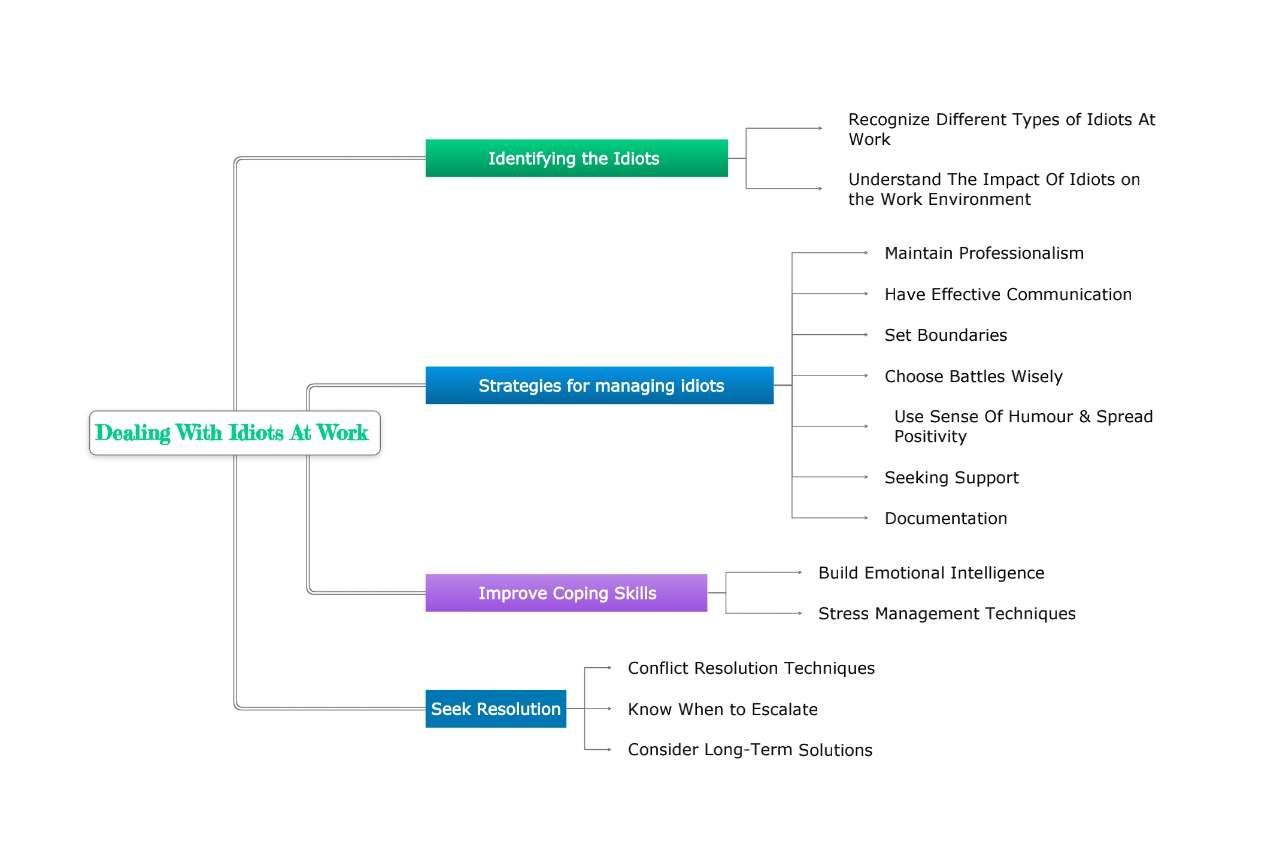Table of Contents
In any workplace, dealing with difficult colleagues—often referred to as “idiots” in colloquial terms—can be a challenging yet common experience.
These individuals may exhibit behaviors like arrogance, gossiping, procrastination, chronic complaining, or even taking credit for others’ work. Such behaviors not only disrupt harmony but also impact productivity and morale within teams.
Learning effective strategies to manage these situations is crucial for maintaining professionalism and fostering a positive work environment. In this article, we’ll learn how to deal with idiots at work & how you can handle them efficiently.
You Might Like: 7 Ways To Deal With Toxic Neighbours
Here is the mind map for the article given below 👇 for better understanding.


Identifying the Idiots:-
Recognizing Different Types of Idiots At Work:-
1. The Know-it-All Guy:
This person always acts like they have all the answers. They dominate meetings and dismiss others’ ideas.
Example: During a team meeting, you suggest a new approach to a project. The Know-it-All immediately shoots it down, insisting their way is the only way that works, without giving your idea a fair chance.
2. The Gossip Guy:
This individual spreads rumors and talks behind people’s backs. They thrive on creating drama and tension.
Example: You hear from a colleague that The Gossip guy has been spreading false information about your performance, making it difficult for you to trust others in the office.
3. The Procrastinator:
This person consistently delays tasks, often causing delays in the team’s progress. They lack time management skills and often leave things to the last minute.
Example: You need a report from The Procrastinator to complete your part of a project. Despite multiple reminders, they deliver it late, causing you to rush your work and stay late to meet the deadline.
You Might Like: 12 Tips On How To overcome Laziness And Procrastination
4. The Complainer:
This colleague always finds something to grumble about, whether it’s the workload, the management, or even the office coffee. Their negativity can be draining.
Example: During a team brainstorming session, The Complainer spends more time talking about how hard the project will be rather than contributing constructive ideas.
5. The Credit Thief:
This person takes credit for others’ work. They present themselves as the mastermind behind successful projects, ignoring the contributions of their teammates.
Example: You spend weeks developing a new marketing strategy. During the presentation to upper management, The Credit Thief presents your ideas as their own, leaving you unacknowledged.
Understanding The Impact Of Idiots on the Work Environment:-
1. Decreased Productivity:
When Procrastinators delay their tasks, it disrupts the workflow for everyone else. Projects take longer to complete, and deadlines are missed, lowering the team’s overall efficiency.
2. Lowered Morale:
The constant negativity from The Complainer can create a toxic atmosphere. When people hear complaints all the time, they may start feeling disheartened and less motivated to do their best work.
3. Increased Stress Levels:
Dealing with The Gossip can be particularly stressful. When you’re unsure who you can trust, you become anxious and less focused on your work. The Know-it-All’s dismissive behavior can also add to your stress, as it makes you feel undervalued and ignored.
Strategies for Managing Idiots:-
1. Maintaining Professionalism:-

Keeping Calm and Composed:
Stay calm and don’t let idiotic colleagues get under your skin. This helps you think clearly and respond appropriately.
When The Know-it-All guy dismisses your idea, take a deep breath and calmly explain your perspective instead of reacting emotionally.
Setting a Good Example:
Model the behavior you want to see in others. Your professionalism can influence the overall work environment.
For instance, if The Gossip tries to engage you in rumors, politely steer the conversation back to work-related topics, showing that you don’t entertain such behavior.
2. Effective Communication:-
Using “I” Statements:
Use “I” statements to express your feelings without blaming others. This reduces defensiveness.
Instead of saying, “You never listen to me,” try, “I feel frustrated when my ideas aren’t considered.” By saying this there will not be conflict between you and your colleagues.
Practicing Active Listening:
Listen attentively to understand the other person’s perspective. This can help resolve conflicts and build better relationships.

For example, when The Complainer is venting, listen without interrupting. Acknowledge their feelings and then suggest focusing on solutions.
Being Clear and Concise:
Communicate your points clearly and directly to avoid misunderstandings.
If you want The Procrastinator to meet a deadline, be specific about the task and the exact time you need it done.
3. Setting Boundaries:-
Defining Personal and Professional Limits:
Clearly establish what behaviors you will and won’t tolerate. This helps protect your time and energy. Let The Credit Thief know that you expect to be acknowledged for your contributions to team projects.
Enforcing Boundaries Consistently:
Stand firm on your boundaries to ensure they are respected.
If The Gossip Guy continues to spread rumors despite your disapproval, remind them firmly of your stance each time they try.
4. Choosing Your Battles:-
Deciding When to Confront:
Not every issue is worth a confrontation. Choose battles that are important and affect your work significantly.
In case, The Know-it-All Guy constantly interrupts but doesn’t impact your work much, it might be better to let it go. However, if their behavior disrupts meetings, it’s worth addressing.
Letting Go of Minor Issues:
Sometimes, it’s best to overlook small annoyances to maintain peace.
For example, if The Complainer gripes about the coffee, it’s not worth getting upset. Save your energy for more important matters.
5. Using Humor and Positivity:-
Defusing Tension with Humor:
A light-hearted joke can ease tension and create a more pleasant atmosphere.
Example: When The Procrastinator finally submits their work late, you could jokingly say, “Better late than never!” to lighten the mood.
Maintaining a Positive Attitude:
Positivity can be contagious and help improve the overall work environment.
Give Compliments to colleagues on their work and remain optimistic about team projects, even when challenges arise.

6. Seeking Support:-
Talking to Trusted Colleagues:
Share your concerns with colleagues you trust. They can offer advice or simply lend a sympathetic ear.
Example: If you’re frustrated with The Credit Thief, discuss it with a friend at work to gain perspective and advice.
Consulting with a Supervisor or HR:
If the situation doesn’t improve, seek help from a supervisor or HR for a formal resolution.
Document incidents involving The Gossip Guy and share them with HR to address the issue officially.
7. Documentation:-
Keeping a Record of Incidents:
Document specific instances of difficult behavior. This provides evidence if you need to take formal action.
Note the dates and details of times The Complainer Guy disrupts meetings, so you have a clear record.
Using Documentation for Formal Complaints:
Use your documentation to support formal complaints to HR or management.
Example: Present your records of The Credit Thief taking credit for your work when discussing the issue with your supervisor.
Improving Your Own Coping Skills:-
1. Building Emotional Intelligence:-
Understanding Your Own Triggers:
Identify what situations or behaviors trigger negative emotions in you. This awareness helps you respond more effectively.
If criticism from The Know-it-All makes you defensive, recognizing this trigger can help you stay calm and respond constructively.
Developing Empathy:
Put yourself in others’ shoes to understand their perspectives and feelings. This fosters better relationships and conflict resolution. Hence develop empathy.
For example, when procrastinators miss deadlines, consider their workload or challenges they may face, which can help you approach them with empathy rather than frustration.
2. Stress Management Techniques:-
Practicing Mindfulness and Meditation:
Mindfulness helps you stay present and calm amidst workplace pressures. Meditation reduces stress and enhances clarity of mind.
Taking a few minutes each day to practice deep breathing or mindfulness exercises can help you manage stress triggered by tight deadlines or difficult interactions.
Regular Physical Exercise:
Exercise releases endorphins that improve mood and reduce stress levels. It also promotes overall well-being.
Incorporating a brisk walk during lunch breaks or joining a fitness class after work can significantly boost your resilience to workplace stressors.

Ensuring Work-Life Balance:
Balancing work demands with personal time helps prevent burnout and enhances overall happiness and productivity.
Set boundaries around work hours and make time for hobbies, family, and relaxation to recharge and maintain a healthy perspective on work challenges.
Seeking Resolution:-
When dealing with challenging situations at work, seeking resolution involves taking proactive steps to address issues effectively.
1. Conflict Resolution Techniques:
Use strategies like mediation or negotiation to find mutually agreeable solutions with the person causing the conflict.
Example: If you and a colleague disagree on project priorities, schedule a meeting to discuss each other’s perspectives and find a compromise that works for both.
2. Know When to Escalate:
Recognize when a situation requires higher-level intervention, such as involving your supervisor or HR, especially if initial attempts to resolve the issue directly have been unsuccessful.
Example: If you’ve tried to resolve ongoing conflicts with The Gossip independently but their behavior persists and affects your work environment, it may be necessary to escalate the matter to HR for further assistance.
3. Considering Long-Term Solutions:
Look beyond immediate conflicts and consider ways to prevent similar issues in the future. This may involve improving communication channels, clarifying roles and responsibilities, or implementing team-building activities.
Example: After resolving a conflict with The Credit Thief over recognition of your work, suggest regular team meetings where achievements are openly acknowledged to foster a more supportive and fair work environment.
Conclusion:
Navigating workplace dynamics with idiots requires a blend of patience, resilience, and strategic approaches.
By maintaining professionalism, setting boundaries, and enhancing personal coping skills such as emotional intelligence and stress management, individuals can effectively manage challenging situations.
Choosing when to confront issues, seeking support when needed, and striving for constructive resolutions are key steps towards fostering a healthier work environment.
Ultimately, by implementing the strategies outlined in this article, individuals can not only mitigate the impact of idiots but also contribute positively to their own professional growth and the overall success of their teams.
Frequently Asked Questions
It’s important to address this behavior calmly and professionally. Consider discussing your concerns privately with the colleague, emphasizing the importance of respectful communication. If the behavior persists, document instances and consider involving a supervisor or HR for further guidance.
Confronting gossip can be delicate. Start by clarifying facts directly with the colleague if possible. Maintain professionalism and avoid retaliating. If the issue persists, consider involving a trusted supervisor or HR to address the behavior and maintain a positive work environment.
Approach the situation diplomatically by discussing deadlines and expectations early on. Offer support or resources if the colleague needs help with time management. Document delays and their impacts on projects to discuss objectively with them or with management if necessary.
Practice active listening, maintain a calm demeanor, and focus on constructive solutions rather than getting emotionally involved. Utilize stress management techniques such as deep breathing or taking short breaks when tensions rise.
Consider escalating when attempts to resolve the issue directly have been unsuccessful or if the behavior significantly impacts your work or the team’s dynamics. Document incidents and seek guidance from HR to address the issue professionally and effectively.



